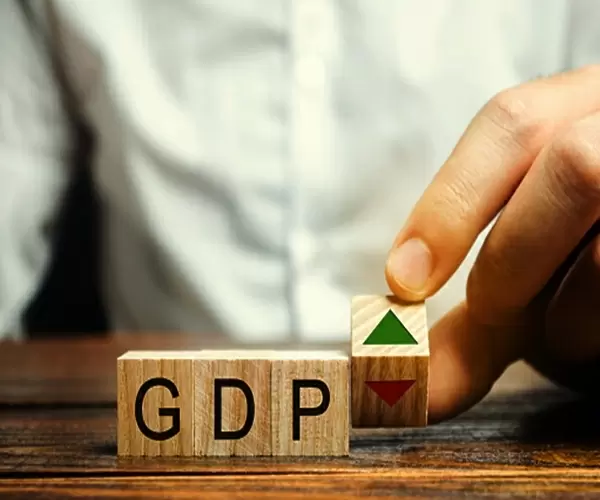India's FY22 GDP to grow over 11%, thanks to timely lockdown
New Delhi
29-January-2021

The Indian economy is witnessing a 'V' shaped recovery due to a timely and stringent lockdown, and is expected to grow at over 11 per cent in the next fiscal.
The survey document, in its debt simulation for worst-case debt analysis, assumed a contraction of 7.7 per cent in 2020-21 and a FY22 growth of 11.5 per cent.
The projection on return of pre-pandemic growth is based on IMF projections of 11.5 per cent real GDP growth in 2021-22 and a 6.8 per cent growth in 2022-23. With these growth projections, India would once again return to become the fastest growing economy in the world.
However, the Indian economy will take at least two more years to return to the growth levels achieved in the pre-pandemic period, the Economic Survey said.
The survey, which has been prepared by Finance Ministry's Chief Economic Adviser Krishnamurthy V. Subramanian, credited the 'V' shaped economic recovery to India's timely and stringent lockdown to curb the spread of the Covid-19 pandemic.
Evidence from the experience of Spanish flu establishes that cities that intervened with lockdowns earlier and more aggressively experience stronger recovery in the economic front in the long run, it said.
Watch This TWL Video
"Learning from this experience, India implemented an early and stringent lockdown from late March to May to curb the pace of spread of Covid-19. With the economy brought to a standstill for two complete months, the inevitable effect was a 23.9 per cent contraction in GDP as compared to previous year's quarter," it added.
"Despite the hard hitting economic shock created by the global pandemic, India is witnessing a V shaped recovery with a stable macroeconomic situation aided by a stable currency, comfortable current account, burgeoning forex reserves, and encouraging signs in the manufacturing sector output," the document said.
"India is reaping the 'lockdown dividend' from the brave, preventive measures adopted at the onset of the pandemic, which were based on the humane principle advocated eloquently in the Mahabharata," it added.
As per the survey, the policy maturity and the alacrity displayed to not "waste a crisis" has helped the country to save both 'lives' and 'livelihoods' in its own unique way and has shifted the focus away from the short-term pain created by the crisis to the potential for long-term gains engendered by the policy response.
Besides, the survey said India requires an active fiscal policy which will ensure accrual of overall benefits from Centre's seminal economic reforms.
It cited fiscal multipliers are disproportionately higher during periods of economic crises than booms.
"Thus, as the Covid-19 pandemic has created a significant negative shock to demand, an active fiscal policy can ensure the full benefit of seminal economic reforms taken by the government," the survey said.
"As the IRGD is expected to be negative in the foreseeable future, a fiscal policy that provides an impetus to growth will lead to lower, not higher, debt-to-GDP ratios."
The Economic Survey examined the optimal stance of fiscal policy in India during a crisis and concluded that it is growth that leads to debt sustainability and not necessarily vice-versa.
It noted the phenomenon of a negative IRGD in India, unlike advanced economies, is not due to lower interest rates but much higher growth rates.
Consequently, the trend has prompted a debate on saliency of fiscal policy, especially during growth slowdowns and economic crises.
On the other hand, the survey pointed out the methodology for sovereign credit ratings should be made more transparent, less subjective and better attuned to reflect India's economic fundamentals.
The survey document elaborated the discrepancies in India's ratings vis-a-vis past trends.
"Never in the history of sovereign credit ratings has the world's fifth largest economy been rated at the lowest rung of the investment grade (BBB-/Baa3) except in the case of China and India," the survey said.
The fifth largest economy has been predominantly rated as AAA, the only exception to this trend has been India and China, the survey said.
Additionally, the survey document said that India's sovereign credit ratings have "no or weak" correlation with macroeconomic indicators. - IANS
More Headlines
Heavy Rains Predicted In Five TN Districts On January 11
Cold Wave Grips Rajasthan: Fatehpur Hits 1.1°C, Nagaur 1.7°C
Actor Ajith Kumar Escapes Unharmed After Crash During 24H Dubai Practice
32 Dead As 7.1 Magnitude Earthquake Strikes Nepal-Tibet Border
Human Metapneumovirus Cases in India Rise to 5, Former WHO Expert Urges Calm
Heavy Rains Predicted In Five TN Districts On January 11
Cold Wave Grips Rajasthan: Fatehpur Hits 1.1°C, Nagaur 1.7°C
Actor Ajith Kumar Escapes Unharmed After Crash During 24H Dubai Practice
32 Dead As 7.1 Magnitude Earthquake Strikes Nepal-Tibet Border
Human Metapneumovirus Cases in India Rise to 5, Former WHO Expert Urges Calm










